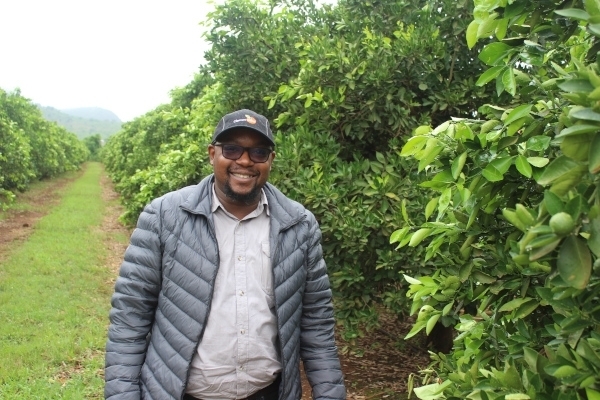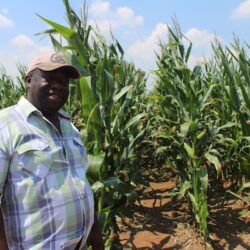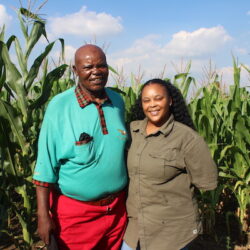Israel Nemaorani, a pioneer black farmer, started farming vegetables in Tshivhilwi outside Thohoyandou in the 1990s and took title to his land in 1994. In 1996 he began to transform the 202ha farm into what is today a successful black-owned commercial citrus farm. Sadly, Israel passed on in 2019. His son, Lavhengwa Nemaorani, intends to make his father proud and take the farm to greater heights. Lavhengwa talks to Peter Mashala about his goals and ideas for the future of Easy Farm.
Easy Farm is a commercial operation producing citrus and bananas in Tshivhilwi village near Thohoyando, at the foot of the southern slopes of the Soutpansberg in Limpopo. Lavhengwa Nemaorani, son of the late Israel Nemaorani, legendary farmer and businessman, runs the farm today. Lavhengwa, who took over the reins from his father before Israel passed away in 2019, says they plant 90ha to citrus, which is exported mainly to Europe.
“We also grow Commercial citrus farmer Lavhengwa Nemaorani says he scraps an orchard once the trees become old and production falls to below 40t/ha. Trees yield their first harvest at three or four years and production peaks at about seven years.
FROM BIG-CITY BUSINESS TO CITRUS AND BANANAS
Israel started farming vegetables on a small scale on the 202ha farm in the 1990s. In 1994 he was granted full title to the land, and he was allocated water for scheduled hectares. Irrigation water is pumped from the Mwedi River, which flows through the property. In 1996, a fellow farmer and friend from Levhubu advised Israel to start farming fruit.
With the help of the owner of Du Roi Nursery in Letsitele, Israel set up a small orchard and never looked back. The Citrus Growers Association (CGA) was so impressed by his operation, they approached Israel and asked him to serve as a board member, which he did for almost 10 years. When he handed over to Lavhengwa, the farm boasted more than 60ha of citrus and 40ha of bananas.
“My dad grew up in this village and later joined the army before he moved to Tembisa in Gauteng to join the police,” says Lavhengwa. But it was not long before Israel and his wife, Eunice, left their jobs to start a small business. They opened a spaza shop that grew into a supermarket, and started a successful dry-cleaner’s in Tembisa. Later they decided to leave Joburg and move back to Tshivhilwi. “They sold off the businesses and re established them in Thohoyandou, where they built a supermarket and a dry-cleaning shop,” he adds.
Once he was back home, Israel’s love of agriculture was rekindled. He planted cash crops such as tomatoes, butternut and cabbage, selling his produce at the Joburg Market until he established the citrus orchards. “While my dad was planting trees and running the farm, my mom was running the businesses in town,” says Lavhengwa. Lavhengwa joined his father in 2009 after a four-year stint working for the Du Roi Group in Letsitele.
He had worked as a general labourer learning the ropes in different sections of the business from 2005. “I started working there after graduating from the Lowveld College of Agriculture. My dad then asked me to come back to the farm in 2009,” recalls Lavhengwa. “Since I’ve taken over, we have expanded the citrus operation to 90ha and reduced bananas to 20ha. We planted the extra 20ha to citrus. There is about 60ha of virgin land that we plan to plant to soft citrus,” he explains.
All the citrus produced on the farm is handled by their own Global GAP-accredited packhouse before it is exported by various companies. “We use Zest Fruit, Alliance Fruit, Extreme International and Rodanto Ltd as our agents,” says Lavhengwa.
On Easy Farm two varieties of oranges are grown: navels (Bahianina) and Valencias (Bennie, Delta, Du Roi, Midnight and Turkey). “Most of our fruit is exported; the fruit that doesn’t qualify for export is sold locally. We don’t set a specific percentage of what we export, as it is determined at harvesting when we do the grading and sorting,” Lavhengwa explains.
“You can never have 100% export fruit. We are working with nature, so anything can happen.” He says sometimes they have hailstorms, or it may rain for two weeks. When it is impossible to spray the trees, pests and diseases have ample time to spread, and this can affect the quality of fruit.
The 202ha farm in the foothills of the southern Soutpansberg in Limpopo is a commercial operation producing citrus on 90ha and bananas on 20ha. Lavhengwa says he plans to
expand the area under production in the near future.
Father and son worked side by sideuntil the late Israel (right on this family photo) handed overthe reins to Lavhengwa. The latter had worked in the citrus sector for the Du Roi Group for four years before Israel summoned him back to the farm.
PACKING FOR EUROPE
Lavhengwa says the busiest time of the year is at harvesting, between May and September. “We start getting ready and preparing from 7am; by 10am, when the morning dew has dried off the trees, we start harvesting.” The Easy Farm packhouse is designed for dry-dumping.
This means the fruit is dumped dry onto a conveyor belt and then taken through high-pressure spray, fungicide sprays, waxing and drying, and – finally – sorting, grading, and packing into boxes of different sizes, Lavhengwa explains. The largest fruit he produces is 36 counts, while the smallest is 125 counts. The packhouse packs more than 152 000 cartons per season – a milestone they reached for the first time in 2018.
Their agents provide the specifications that guide Easy Farm’s order preparation. “There are different preferences on the market – some want smaller fruit, and some want large fruit. Some of the fruit also goes for juicing overseas,” Lavhengwa explains. It is a stressful time for the farmers, because if things go wrong in the cold chain during transportation and the fruit is rejected, the customer will claim from the farmer.
According to Lavhengwa, his biggest challenge is funding. “Our packhouse needs up-to-date equipment with the latest technology, so we can get into the more lucrative markets like China,” he says. “Right now, I can’t touch China because of my old equipment.”
The machinery, which he bought last year, is second-hand. Lavhengwa would like machines with an optical sizer to check the percentages of the blemishes as per China’s specifications. This is a task that cannot be done manually. “New machines will save us time,” he explains. “What we do now in a 12-hour shift, we should be able to do in six hours. It would be much more efficient, and it would give us a competitive edge, because we would get the fruit off the farm and onto the market quicker.”
Boxes of citrus packed and ready to be shipped for export to Europe. Lavhengwa is looking at more lucrative markets in places like China, but says he needs to upgrade his packing equipment before he can meet the more rigorous standards set by these markets.
Lavhengwa has reduced the area planted to bananas from 40ha to 20ha to free up more land for citrus. Most of Easy Farm’s citrus is exported, whereas the bananas are sold on local markets.
ORCHARD LIFE
The harvesting period might be the busiest time, but there is always activity on the farm. From Day 1 of planting, Lavhengwa says, one must invest in maintaining the trees. “For the first three years of the tree’s life, you just spend money on it – money for electricity, irrigation, fertilisation and spray programmes.” The oldest trees on Easy Farm were planted in 1998, whereas the youngest were planted in 2019.
This year, these young trees will be harvested for the first time, for the export market. “Depending on the management system, trees will start to bear good fruit when they are between three and four years old. Their production peaks from seven years to go beyond the 40t/ha mark,” Lavhengwa says. The records on each orchard block determine whether the trees should be replaced. “I won’t accept anything below 40t/ha. But 40t/ha is just a norm or a minimum – some farmers won’t tolerate less than 50t/ha or 60t/ha,” he says.
GROUNDWORK
In February, Lavhengwa says, they take soil and leaf samples for analysis. The results of the analysis will determine what type of fertiliser is needed and when it should be applied. “We scout continuously for insects and pests. This helps us with our chemical spray programme. The biggest problems we face are black spot and thrips during flowering.
These can cause serious damage to the orchards in the blink of an eye,” explains Boxes of citrus packed and ready to be shipped for export to Europe. Lavhengwa is looking at more lucrative markets in places like China, but says he needs to upgrade his packing equipment before he can meet the more rigorous standards set by these markets. Lavhengwa. It is clear that maintenance on a citrus farm is an ongoing process that never stops.
Lavhengwa’s plans for the farm go beyond developing the remaining 60ha under soft citrus. “Once I’m done covering everything here, I plan to look for more land outside the village,” he says. He insists that he is still young and passionate about what he does. “I would like to set an example for the youth, show them that agriculture is the way to go. I want to contribute to the economy by earning foreign currency and creating much-needed jobs,” he says. His drive and passion are what wakes Lavhengwa up every day, Monday to Sunday, to work on the family farm.




